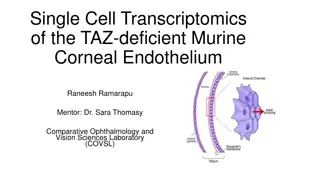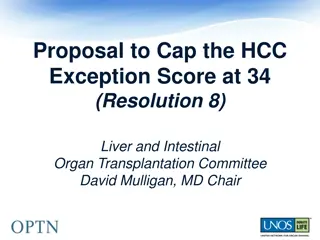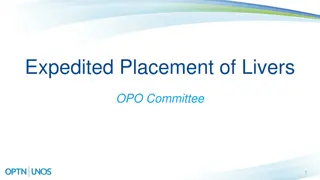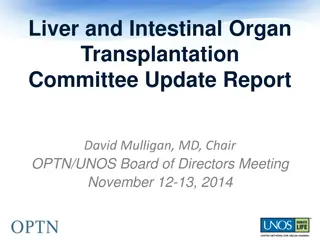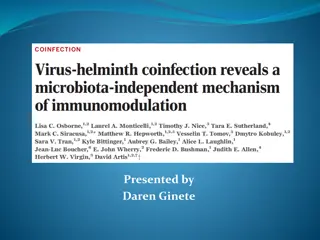Transcriptomics-based ML Analysis Predicts Space-Exposed Murine Livers
Transcriptomics-based machine learning (ML) analysis to predict the effects of space exposure on murine livers. The study involves a cross-disciplinary team of scientists from SAIC, NASA Langley Research Center, Scimentis LLC, University of North Carolina-Chapel Hill, University of Houston, AROSE, a
0 views • 25 slides
Single-Cell Transcriptomics of TAZ-Deficient Murine Corneal Endothelium
This study explores the single-cell transcriptomics of TAZ-deficient murine corneal endothelium in the context of Fuchs Endothelial Corneal Dystrophy (FECD), a polygenic disease affecting millions globally. The research utilizes a TAZ-deficient mouse model to mimic late-onset FECD, revealing reduced
2 views • 39 slides
Proposal to Cap the HCC Exception Score at 34 for Liver and Intestinal Organ Transplantation
Share 35 policy implemented to direct livers to high-risk patients, but liver offers are going to candidates with lower risk. This proposal aims to prioritize candidates most in need of liver transplants by capping the HCC exception score at 34.
0 views • 11 slides
Proposal for Expedited Placement of Livers in OPO Committee
This proposal aims to address the lack of policies regarding expedited placement of livers, leading to inconsistencies in access for transplant candidates. The solutions include creating a system for expediting liver offers, focusing on in-OR turndowns, and implementing opt-in criteria for transplan
0 views • 14 slides
Liver and Intestinal Organ Transplantation Committee Update Report
This report, presented by Dr. David Mulligan at the OPTN/UNOS Board of Directors Meeting in November 2014, discusses the strategic plan to increase access to transplants, focusing on liver transplantation prioritization based on need. Data from two eras show trends in deceased donor liver transplant
0 views • 14 slides
Understanding Helminths and Immunomodulation: A Comprehensive Study
Helminths, parasitic organisms affecting a large part of the global population, can modify the immune response through immunomodulation. This research delves into the interaction between helminths, microbiome, and immune response, exploring the effects on macrophages, alternative activation, and the
0 views • 28 slides

